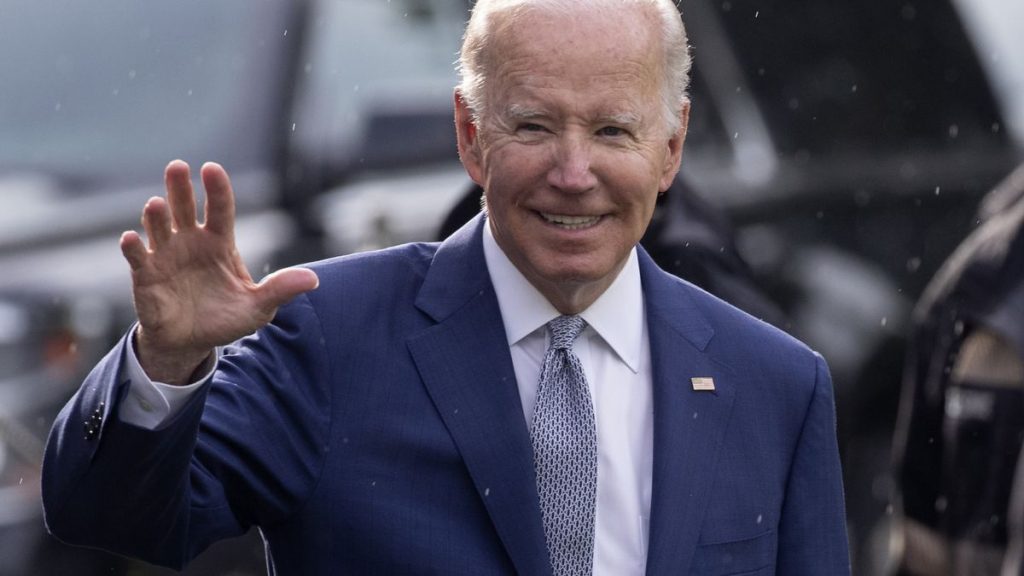President blames high US pump prices on Russia’s invasion
Move on gasoline contradicts efforts to reduce fossil fuel use
President Joe Biden called on Congress to suspend the federal gasoline tax, a largely symbolic move by an embattled president running out of options to ease pump prices weighing on Democrats’ political prospects.
“By suspending the 18-cent federal gas tax for the next 90 days, we can bring down the price of gas and give families just a little bit of relief,” Biden said Wednesday at the White House.
It was an all-but-futile appeal, however, as lawmakers — even Democrats — quickly signaled they had little appetite for the move. Representative Richard Neal, the Democratic chairman of the tax-writing House Ways and Means Committee, audibly groaned after he was asked about Biden’s proposal.
Senate Majority Leader Chuck Schumer said Democrats in his chamber had already attempted a gas tax suspension “and the Republicans blocked it.” He said the most important way to lower gasoline prices was to “crackdown on Big Oil manipulation of oil markets. The cost of getting the oil out of the ground has not increased.”
Buy WSJ Digital Subscription 3 Years WSJ Online Reading Buy Now and Get 70% Off
House Speaker Nancy Pelosi was similarly noncommittal.
“We will see where the consensus lies on a path forward for the president’s proposal in the House and the Senate, building on the strong bills to lower prices at the pump already passed by House Democrats,” she said in a statement. She’s previously expressed skepticism that any savings would be passed onto consumers.
Biden said that states, many of which are enjoying budget surpluses thanks in part to federal pandemic stimulus, should also suspend their own gas taxes, and he called on refiners and gasoline retailers to make sure “every penny” of the tax pause goes to consumers.
“Your customers, the American people, they need relief now,” Biden said. “Bring down the price you are charging at the pump to reflect the cost you are paying for the product. Do it now, do it today.”
‘Stand Up to Putin’
He also rebutted Republican criticism of his handling of gasoline prices, blaming much of the spike on Russia’s invasion of Ukraine.
“For all those Republicans in Congress criticizing me today for high gas prices in America, are you now saying we were wrong to support Ukraine?” he said. “Are you saying we were wrong to stand up to Putin? Are you saying that we would rather have lower gas prices in America and Putin’s iron fist in Europe?”
Buy WSJ Digital Subscription 5 Years WSJ Online Reading Buy Now and Get 70% Off
The average national price for regular unleaded is up about 38% since Russia invaded Ukraine on Feb. 24, according to data from the motor club AAA compiled by Bloomberg.
“I get the easy politics of the attack,” Biden added. “But the simple truth is gas prices are up almost $2 a gallon because Vladimir Putin’s ruthless attack on Ukraine and we wouldn’t let him get away with it.”
The president is pushing to cut fuel costs that have become a political albatross heading into November midterm elections. He has previously ordered millions of barrels of oil released from the Strategic Petroleum Reserve and needled oil giants at home and abroad to open the taps on production, with little effect on pump prices.
“Bottom line is this is just kind of another rhetorical tool of the White House to sort of show that they’re doing everything they can on inflation,” Libby Cantrill, head of public policy at Pacific Investment Management Co., said Wednesday on Bloomberg Television.
Biden’s move is also run through with policy contradictions: he has moved to curtail US oil production in the past before now urging its expansion, and cutting the price of gasoline may encourage higher consumption, countering his efforts to reduce US dependence on fossil fuels.
WSJ And Barrons News Digital Combo Offer 5 Years Buy Now
And suspending gasoline taxes could actually backfire, potentially resulting in even higher prices. One Biden aide acknowledged that it wouldn’t be an option under consideration were it not for the war in Ukraine.
“This is not a proposal that you call for at all times,” Biden adviser Gene Sperling said in a Bloomberg Radio interview on Wednesday. “I think there’s been plenty of times when I would have said, ‘hey, we don’t need to do that, ‘but let’s think about what the moment is right now.”
Instead, the appeal represents part of a steady rhetorical push by Biden to pin congressional inaction on Republicans, as he ratchets up contrasts heading into the midterm elections.
Potential Backfire
Biden called on Congress to suspend both the federal tax on gas and the 24-cent-per-gallon tax on diesel for three months through the summer. That would be in addition to any state-level suspensions. Collectively, aides argue the suspensions would shave 50 cents a gallon off the price at the pump.
The national average of US prices is hovering near record levels, at about $5 a gallon.
State-level moves showcase the possibility of resulting price spikes. Some states that paused their own fuel taxes saw prices come back higher than they would have been without a suspension, according to a study by the Wharton School at the University of Pennsylvania.
Economists are generally skeptical a gasoline tax suspension will accomplish its intended goal. Cutting the price could boost demand at a time when supply is at a premium — potentially driving prices up.
Jason Furman, a Harvard professor who led President Barack Obama’s Council of Economic Advisers, argued on Twitter that most of the benefit of the tax cut would therefore go to suppliers rather than consumers.
“The substantive case for the policy is weaker than ever,” Tobin Marcus, senior US policy strategist at Evercore ISI, wrote in a note Wednesday. “Subsidizing demand in a supply crunch would be counterproductive, the size of the tax cut relative to pump prices is marginal, and elevated refinery utilization means more of the benefit would be captured by producers rather than consumers.”
Marcus also said that, by taking months to decide to back a plan that had been floated by some lawmakers earlier this year, “this announcement suggests that few new ideas are forthcoming.”
Claudia Sahm, a former Federal Reserve economist, emphasized in a recent blog post that the path to lowering gas prices is increasing supply and lowering demand. As for the gas tax holiday, she said, “it is somewhat gimmicky, would have a limited effect on gas prices, and would increase demand some.”
“But at least the holiday would push down prices on the gas station signs some, and every ten cents count,” she said.

